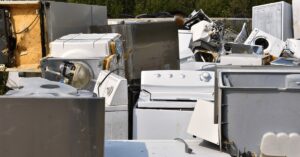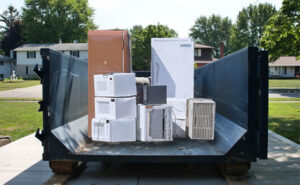The Risks of Improper Appliance Disposal: What You Should Avoid
Disposing of old appliances may seem straightforward, but improper disposal can lead to a range of problems, from environmental hazards to legal consequences. Many people are unaware of the risks involved when they fail to follow proper disposal procedures, leading to long-term issues that affect communities and ecosystems. Understanding the dangers and knowing what to avoid can help ensure a responsible approach to getting rid of old appliances.
Environmental Hazards and Pollution
 One of the biggest risks of improper appliance disposal is environmental pollution. Many household appliances contain chemicals and materials that can be harmful when released into the environment. Refrigerators and air conditioners, for example, often contain refrigerants such as chlorofluorocarbons (CFCs) and hydrofluorocarbons (HFCs), which contribute to ozone depletion and climate change if not handled correctly. Similarly, older appliances may contain hazardous metals such as lead and mercury, which can contaminate soil and water sources if disposed of improperly.
One of the biggest risks of improper appliance disposal is environmental pollution. Many household appliances contain chemicals and materials that can be harmful when released into the environment. Refrigerators and air conditioners, for example, often contain refrigerants such as chlorofluorocarbons (CFCs) and hydrofluorocarbons (HFCs), which contribute to ozone depletion and climate change if not handled correctly. Similarly, older appliances may contain hazardous metals such as lead and mercury, which can contaminate soil and water sources if disposed of improperly.
When appliances are dumped in landfills without proper treatment, they can leak toxic substances into the ground, affecting the quality of groundwater. Over time, these pollutants can enter the food chain, leading to serious health concerns for both humans and wildlife. Recycling or properly disposing of appliances through designated programs helps prevent these dangers and reduces environmental harm.
Health Risks to Individuals and Communities
Improper appliance disposal poses a significant threat to human health, particularly in areas where waste management systems are inadequate. Appliances left in open spaces can attract pests, such as rodents and insects, which carry diseases. Additionally, sharp edges, exposed wiring, and broken components can pose physical dangers to those who come into contact with discarded appliances, especially children playing near abandoned items.
Certain appliances contain harmful gases or chemicals that, when improperly handled, can release toxins into the air. Burning appliances to extract metal parts, a practice sometimes done in informal recycling operations, can release dangerous fumes that contribute to respiratory diseases. By disposing of appliances correctly through authorized recycling centers, communities can prevent these health hazards and create a safer living environment.
Legal Consequences and Financial Penalties
 Many regions have strict regulations regarding the disposal of electronic and household appliances. Ignoring these laws can result in fines, penalties, or even legal action. Local authorities often require individuals and businesses to follow specific procedures for recycling or disposing of large appliances, ensuring that hazardous materials are handled correctly.
Many regions have strict regulations regarding the disposal of electronic and household appliances. Ignoring these laws can result in fines, penalties, or even legal action. Local authorities often require individuals and businesses to follow specific procedures for recycling or disposing of large appliances, ensuring that hazardous materials are handled correctly.
Illegal dumping of appliances is considered a serious offense in many places. Homeowners who leave appliances on the curb without arranging proper disposal may be subject to fines. Businesses that fail to comply with environmental regulations may face even steeper penalties, which can impact their reputation and finances. Proper disposal methods, such as scheduling pick-ups with certified recycling programs or taking appliances to designated drop-off sites, help individuals and organizations stay compliant with the law.
The Impact on Natural Resources
Appliances often contain valuable materials such as copper, steel, and aluminum that can be recovered and reused. When disposed of improperly, these resources go to waste, increasing the demand for new raw materials. Mining and manufacturing processes required to replace these lost materials contribute to deforestation, energy consumption, and pollution.
Recycling appliances not only conserves natural resources but also reduces greenhouse gas emissions associated with the production of new materials. Many recycling facilities are equipped to safely extract and process reusable components, ensuring that old appliances contribute to a more sustainable cycle rather than ending up as environmental pollutants.
Safe and Responsible Disposal Practices
To avoid the risks associated with improper appliance disposal, it is essential to follow recommended practices. Many manufacturers and retailers offer take-back programs where old appliances can be returned for proper disposal or recycling. Additionally, local municipalities often provide collection services for large appliances, ensuring they are processed safely.
Donating functional appliances to charities or organizations that refurbish and distribute them to those in need is another responsible way to handle disposal. For appliances that are no longer usable, working with licensed recycling facilities ensures that hazardous materials are safely removed while valuable components are reclaimed for future use.